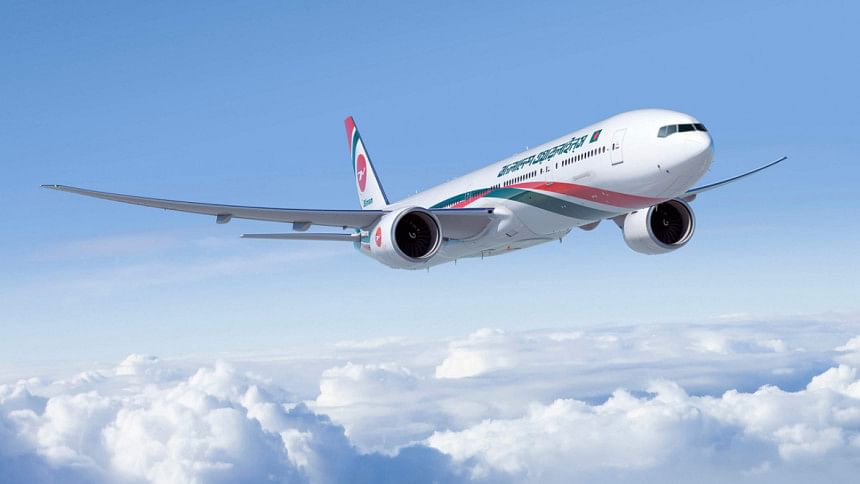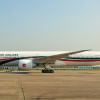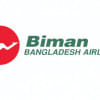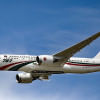Can Biman have a fresh beginning?

Following the July-August mass uprising, almost all service organisations, corporations, administrative bodies, and government offices in the country are experiencing significant changes, reshuffling, and overhauls. Previously stifled voices are now being heard, and we expect a new Bangladesh to emerge from the wreckage left behind by the Awami League government. The extent of embezzlement is staggering. Any honest person who envisions what could have happened if this money had been invested into the economy can't help but feel enraged by the fallen regime.
Towards the end of the regime, Salman F Rahman, the former adviser to the former prime minister on private industry and investment, spearheaded an attempt to purchase 10 new aircraft from Airbus. The intent was brazenly clear: to embezzle funds. That chapter is now closed. It's time to look forward and build a new Biman founded on professionalism, efficiency, transparency, and accountability.
The aviation industry experienced an unprecedented lull during the Covid pandemic, followed by a tremendous boom. Despite this, Biman has underperformed, especially considering it has a relatively young fleet.
In the aviation business, the margin for error is extremely narrow. A single poor decision can lead to total chaos for any airline. An accident can damage an airline's brand image so severely that it may take months to regain passenger confidence. Building a brand is a slow and painstaking process, but it can ensure a return on investment. For effective branding of Biman, key areas require attention.
A major complaint against Biman is its poor "on-time performance". In the recent past, the importance of punctuality has been largely ignored. The airline's vision and mission do not appear to be clearly communicated to its employees and departments. A concerted effort is essential to ensure flights are dispatched on time.
Aircraft serviceability is one of the most important areas for profit maximisation. Aircrafts must be serviceable and in good condition, including in-flight entertainment systems. An aircraft that sits idle is useless unless the airline's operations are so inefficient that it is cheaper to keep aircrafts grounded.
Another issue that needs focus is efficiency, which is essential in every aspect of the airline, from marketing and sales to dispatch, engineering, maintenance, pilots, and cabin crew. Investment in efficient human resources and systems is never wasted and is crucial to achieving efficiency. As such, it is essential to emphasise proper recruitment and training, especially of managers.
A positive work environment is critical. Disengaged employees can cause significant losses. Responsibility and ownership are key contributors to an airline's brand image and efficiency. We need empathetic, knowledgeable managers. Certain problematic individuals must be removed from sensitive positions immediately.
Modern aircraft have the unique ability to communicate their health status to engineers, even mid-flight. However, we often fail to take advantage of this technology due to inadequate spare parts provisioning. Delaying repairs because of cost-cutting can be disastrous. Aircraft should not be left idle for days due to a lack of necessary parts. The prospect of providing maintenance to more foreign carriers may be explored to expand the spares pool.
Many of our international flights include short segments, such as Dhaka-Sylhet or Dhaka-Chattogram, before proceeding to the ultimate destination, which highly increases operating expenses. These short flights waste valuable engine, landing gear and auxiliary power unit (APU) cycles. A better strategy would be to operate point-to-point international routes, like Dhaka to Dubai, Dubai to Chattogram, then Chattogram to Jeddah and so on. This would not only avoid unproductive short sectors but also save on engine, landing gear, and APU cycles. The short-sector flights are choking off domestic operators. The national carrier should not monopolise the market at the expense of underperformance.
Crew shortages should not hinder expansion or planning. Recruitment should be regular and recruitment numbers should be manageable within a set timeframe. Currently, because of crew shortage, and the reluctance of crew to stay over in Sylhet and Chattogram, direct flights from these cities cannot be operated. Inadequate crew numbers do not allow crew to take time off to attend to personal matters. Aspiring young pilots should be given the opportunity to join Biman, and current pilots who meet the requirements should be promoted in due time.
Biman is a relatively small airline with few airplanes. So, it is very important to take advantage of any opportunity to optimise operations that come our way. For instance, the decision to procure Boeing 787s, despite their delayed delivery, was influenced by the ability of pilots to fly both Boeing 787s and 777s simultaneously. However, when the 787s arrived, the crew for both aircraft types were segregated, causing problems in planning issues and crew dissatisfaction. There are also issues with aircraft allocation in different routes that should be revisited.
Biman must immediately focus on future fleet planning based on pragmatic business solutions and operational needs. Failing to plan ahead will lead to major operational problems. We are already in a stage where aircraft shortage is inevitable.
Another area is communicating delays. We often see passengers getting agitated at the holding area because of a lack of information regarding delays. Passengers readily accept a delay of less than 30 minutes or even more if they are updated about it along with the reasons. Biman traffic personnel needs training on providing updated delay messages to passengers without exception. Any delay of more than 15 minutes must be communicated to the passengers.
Lastly, sufficient executive power must be granted to the managing director and chief executive officer to hold them accountable for decisions. In recent years, the board and its subcommittees made almost all decisions, leaving central management unaccountable. This led to unnecessary delays, and in some cases, decisions were rendered ineffective by the time they were made.
Proper brainstorming will bring forth many more steps that can be taken for the advancement of Biman and improve its brand image.
Captain A M Maqsood Ahmed is captain of Boeing 777 with Bangladesh Biman and a former member of the fleet planning committee, that did the groundwork for the purchase of 10 new generation Boeing aircraft.
Views expressed in this article are the author's own.
Follow The Daily Star Opinion on Facebook for the latest opinions, commentaries and analyses by experts and professionals. To contribute your article or letter to The Daily Star Opinion, see our guidelines for submission.

 For all latest news, follow The Daily Star's Google News channel.
For all latest news, follow The Daily Star's Google News channel. 










Comments